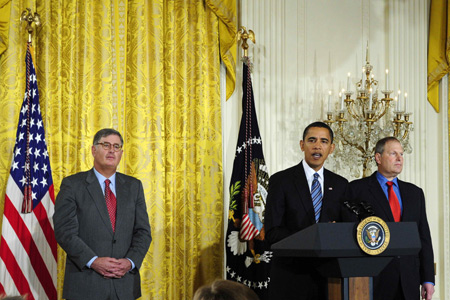|

|
|
U.S. President Barack Obama (C) delivers remarks on the economy after an economic meeting with company CEOs in the East Room of the White House in Washington, the United States, Jan. 28, 2009. [Xinhua/Zhang Yan]
|
Republicans argued that too much of the House measure is wasteful spending.
Another concern from them is the plan's impact on the federal budget deficit, which hit a record 455 billion dollars in the 2008fiscal year and is expected to soar to 1.2 trillion dollars without the stimulus in the current fiscal year that ends Sept. 30,2009.
The CBO estimated that the House measure would add 169.5 billion dollars in fiscal 2009 and 356 billion dollars in fiscal 2010 to the federal deficit.
Both Democrats and Republicans, however, have realized that the dismal economic outlook demands they approve a huge influx of money.
On Wednesday, the International Monetary Fund (IMF) sharply slashed its 2009 world economic growth projections to 0.5 percent, the lowest rate since World War II.
"Despite wide-ranging policy actions, financial strains remain acute, pulling down the real economy," said the IMF in its updatedWorld Economic Outlook.
The United States, the world's largest economy and epicenter of the ongoing financial crisis, is expected to contract by 1.6 percent this year, much worse than the 0.7 percent decline the IMF projected in November 2008.
Meanwhile, America's unemployment rate reached 7.2 percent in December 2008, the highest in 16 years. Obama's economists say the jobless rate could top 10 percent before the recession ends.
Employers axed 2.6 million jobs last year, the most in any single year since World War II. Manufacturing is at a 28-year low, one in 10 homeowners is at risk of foreclosure and more banks have failed.
The House vote sent the bill to the Senate, where debate is expected to begin as early as this week on a companion measure already taking shape.
It was reported that the Senate is considering a more expensive bill. Its price tag is about 887 billion dollars because it will include a one-year fix to insulate middle-class taxpayers from the Alternative Minimum Tax, which, originally aimed at the wealthy, is affecting a growing number of taxpayers because of inflation.
Democrats want to send Obama a bill he can sign into law by mid-February, as the president hopes. The bill could be the single largest ever to go through Congress.
(Xinhua News Agency January 29, 2009)